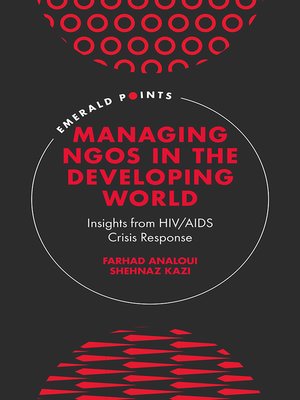Managing NGOs in the Developing World
ebook ∣ Insights from HIV/AIDS Crisis Response · Emerald Points
By Farhad Analoui

Sign up to save your library
With an OverDrive account, you can save your favorite libraries for at-a-glance information about availability. Find out more about OverDrive accounts.
Find this title in Libby, the library reading app by OverDrive.



Search for a digital library with this title
Title found at these libraries:
| Library Name | Distance |
|---|---|
| Loading... |
NGO managers in the developing world play a crucial role in reaching diverse high-risk groups. Yet to date there has been no empirical study of what makes these managers effective.
Here Farhad Analoui and Shehnaz Kazi present the first qualitative, empirical insights into this key question. Focusing specifically on managers of HIV/AIDS NGOs in India - one of the world's largest developing nations - this book considers how such managers are perceived by outsiders, how their work is or could be influenced by government-level intervention or international-policy-level drivers such as the UN Sustainable Development Goals, and how such managers perceive issues that influence their ability to manage their organisations effectively.
Through individual, collective, and focus-group interviews with managers and staff at four NGOs, the authors build a startlingly rich picture of aid workers' and managers' fears and hopes. From this data, the authors confirm eight parameters of effectiveness, three interrelated contextual factors, and discover a culturally adjusted new framework for analysis of the NGO managers behaviour at work.
For its wealth of qualitative empirical data with broad-ranging implications for all developing countries, Managing NGOs in the Developing World is a must-read for researchers, students, and practitioners interested in the intersections between human resource management, international development, and sustainable development.
Here Farhad Analoui and Shehnaz Kazi present the first qualitative, empirical insights into this key question. Focusing specifically on managers of HIV/AIDS NGOs in India - one of the world's largest developing nations - this book considers how such managers are perceived by outsiders, how their work is or could be influenced by government-level intervention or international-policy-level drivers such as the UN Sustainable Development Goals, and how such managers perceive issues that influence their ability to manage their organisations effectively.
Through individual, collective, and focus-group interviews with managers and staff at four NGOs, the authors build a startlingly rich picture of aid workers' and managers' fears and hopes. From this data, the authors confirm eight parameters of effectiveness, three interrelated contextual factors, and discover a culturally adjusted new framework for analysis of the NGO managers behaviour at work.
For its wealth of qualitative empirical data with broad-ranging implications for all developing countries, Managing NGOs in the Developing World is a must-read for researchers, students, and practitioners interested in the intersections between human resource management, international development, and sustainable development.







